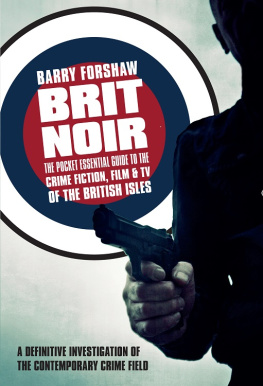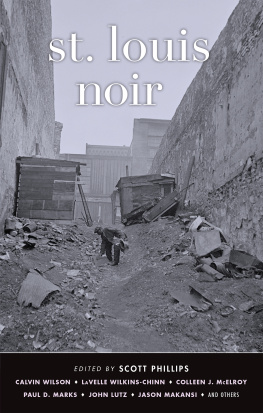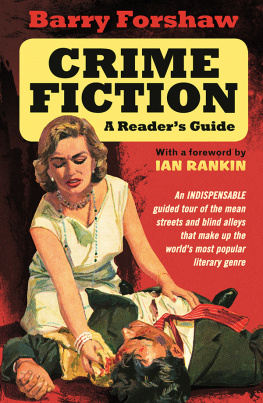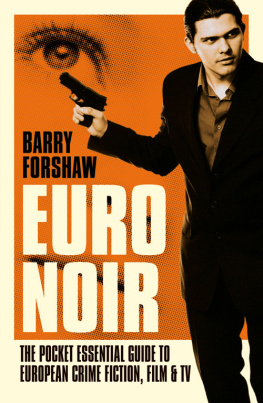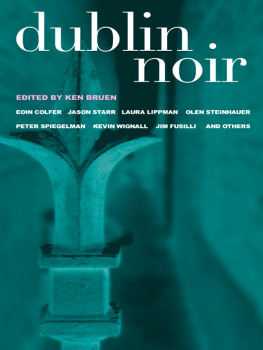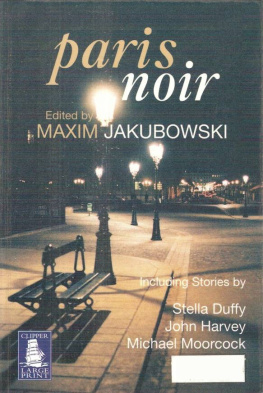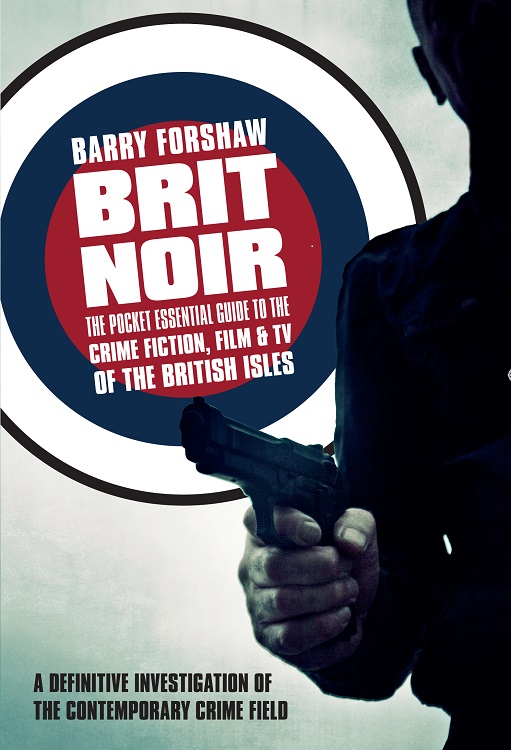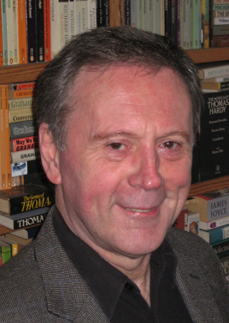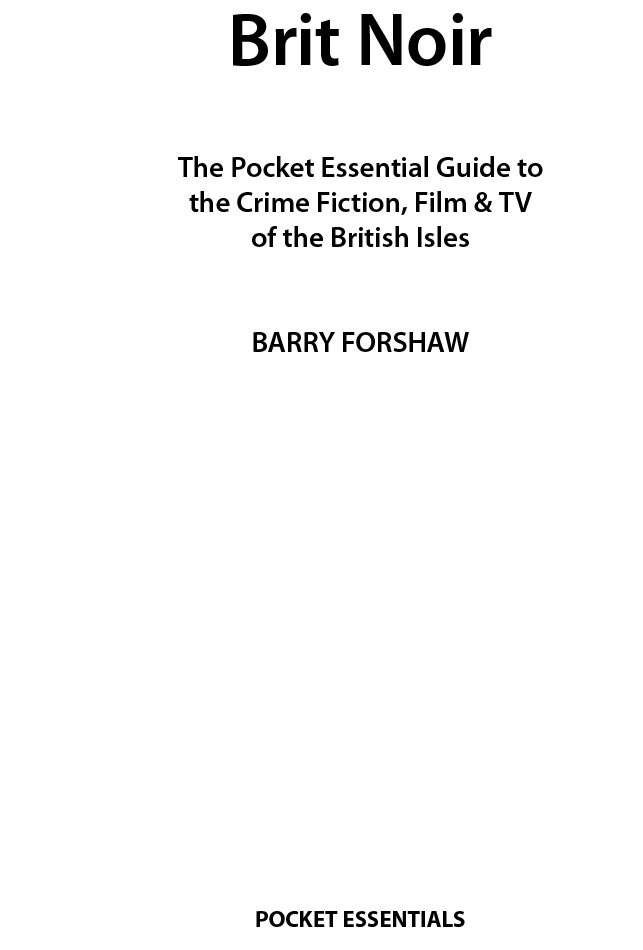Brit Noir
Barry Forshaw is acknowledged as a leading expert on crime fiction and films from European countries, but his principal area of expertise is in the British crime arena, as demonstrated in such books as British Crime Writing , The Rough Guide to Crime Fiction and British Crime Film . After the success of earlier entries in this series, Nordic Noir and Euro Noir , he returns to the UK to produce the perfect readers guide to modern British crime fiction (taking in the best from England, Scotland and Wales, and including, for good measure, Ireland). The word noir is used in its loosest sense: every major living British writer is considered, often through a concentration on one or two key books, and exciting new talents are highlighted for the reader.
But the crime genre is as much about films and TV as it is about books, and Brit Noir is also a celebration of the former. British television crime drama in particular is enjoying a new golden age (from Sherlock to Broadchurch ), and all of these series are covered here, as well as the most important recent films and TV in the field.
Barry Forshaws personal acquaintance with writers, editors and publishers is unparalleled, so Brit Noir contains a host of new insights into the genre and its practitioners.
About the Author
Barry Forshaw is one of the UKs leading experts on crime fiction and film. His books include Nordic Noir , Sex and Film and The Rough Guide to Crime Fiction. Among his other work: Death in a Cold Climate , British Gothic Cinema , Euro Noir and the Keating Award-winning British Crime Writing: An Encyclopedia , along with books on Italian cinema and Stieg Larsson. He writes for various national newspapers, edits Crime Time (www.crimetime.co.uk), and is a regular broadcaster and panellist. He has been Vice Chair of the Crime Writers Association, and teaches an MA course at City University on the history of crime fiction.
Praise for Barry Forshaw
CRITICAL ACCLAIM FOR EURO NOIR
An informative, interesting, accessible and enjoyable guide as Forshaw guides us through the crime output of a dozen nations The Times
An exhilarating tour of Europe viewed through its crime fiction Guardian
Exemplary tour of the European crime landscape... supremely readable The Independent
This is a book for everyone and will help and expand your reading and viewing We Love This Book
Like all the best reference books, it made me want to read virtually every writer mentioned. And, on another note, I love the cover crimepieces.com
If I did want to read something so drastically new, I now know where I would begin. With this book Bookwitch
Barry Forshaw is the master of the essential guide Shots Mag
This enjoyable and authoritative guide provides an invaluable comprehensive resource for anyone wishing to learn more about European Noir, to anticipate the next big success and to explore new avenues of blood-curdling entertainment Good Book Guide
Fascinating and well researched refreshing and accessible The Herald
An entertaining guide by a real expert, with a lot of ideas for writers and film/TV to try Promoting Crime Fiction
a fabulous little book that is like a roadmap of Europe crime fiction Crime Squad
Fascinated by Scandinavian crime dramas? Go to this handy little guide News at Cinema Books
Introduction
The current state of British crime writing
It might be argued that the low esteem in which British crime writing was held for so many years allowed it to slowly cultivate a dark, subversive charge only fitfully evident in more respectable literary fare. And precisely because genre fiction was generally accorded critical indifference (except by such astute highbrow commentators and fans as WH Auden), this critical dismissal was consolidated by the fact that readers while relishing such compelling crime and murder narratives looked upon the genre as nothing more than harmless entertainment. Since the status of crime writing was subsequently elevated by writers such as PD James, many modern writers now utilise the lingua franca of crime fiction in innovative fashion, with acute psychological insights freighted into the page-turning plots.
Similarly, informing much of the work of contemporary British crime writers the subject of this study, as opposed to writers of the recent past or the Golden Age, or historical crime fiction is a cool-eyed critique of modern society. But not all current practitioners are this ambitious in terms of giving texture to their work. For that matter and lets be frank here a great many modern writers are little more than competent journeymen (and women); the genre is still beset by much maladroit or threadbare writing, particularly in an age of self-publishing, where editorial input is painfully conspicuous by its absence.
Nevertheless, prejudices have been eroded (hallelujah!), and crime fiction on the printed page is now frequently reviewed in the broadsheets by writers such as myself alongside more literary genres, but often in crime column ghettos (although solus reviews are not unknown). However, literary editors in my experience still favour overly serious writers above those they perceive as entertainers. So, whats the state of modern crime writing in the UK today? Ive attempted to tackle that question in the following pages.
This is not a social history of the British crime novel, though it touches on the more radical notions of the genre; however, the readers guide format Ive used (with entries ranging from the expansive to the concise) hopefully allows for a comprehensive celebration of a lively genre a genre, in fact, that continues to produce highly accomplished, powerfully written novels on an almost daily basis. Whats more, despite the caveats above, Britain including Scotland (not yet cut away from the rest of the UK, despite the wishes of Ms Sturgeon and Mr Salmond) and Ireland are enjoying a cornucopia of crime writers who have the absolute measure of the four key elements of crime writing (social comment is a bonus). And those four key elements? They are:
1.strong plotting
2.literate, adroit writing
3.complex characterisation
4.vividly evoked locales.
Murderous secrets and professional problems
Readers have plenty of cause to be thankful, as these crowded pages will demonstrate. But this wasnt an easy book to write. The range of contemporary crime fiction (as opposed to the historical variety) in the UK is surprisingly broad, given that the geographical parameters of the British Isles and its Celtic neighbours are proscribed compared with the massive canvas of the United States. But the parochial nature of much British crime fiction might be precisely what imbues it with its customary sharpness when murderous secrets confined in British suburban spaces are set free, the results are explosive. And then there is the perception of the British love of order (although such stereotypes are in flux at present); crime novels are particularly satisfying in that we are invited to relish the chaos unleashed by the crime and criminals before the status quo is re-established. This is a process that has a particular resonance for the British character more so than for, say, Americans (the barely contained pandemonium of the large American city is never really tamed). Of course, when Charles Dickens and Wilkie Collins introduced several of the key tropes of crime fiction in such classics as Bleak House and The Woman in White , neither author had any thought of creating a genre. It is instructive to remember that their books, while massively popular, lacked the literary gravitas in their day that later scholarship dressed them with; this was the popular fare of the time, dealing in the suspense and delayed revelation that was later to become the sine qua non of the genre. In generic fiction, the inhabitants of 221b Baker Street and their celebrated creator are, of course, the most important factors in terms of generating an army of imitators notably Agatha Christies Hercule Poirot and Holmes clones continue to surface to this day, dressed in contemporary garb rather than deerstalker and Inverness cape but still demonstrating impressive ratiocination.

